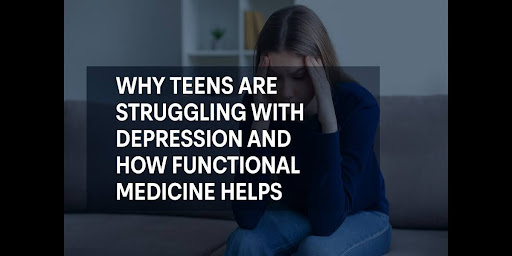The issue of teen depression is not a secret anymore. Sadness, anxiety and emotional distress are on the rise among adolescents across the world. Although the traditional methods of addressing depression cannot be ignored, more parents and health practitioners are resorting to functional medicine in depression, which deals with the causes of the occurrence of mental wellness issues.
The Rising Tide of Teen Depression
The world health organization has observed that depression is a major cause of illness as well as disability among adolescents. According to the CDC, about 1 out of every 5 teenagers in the United States has had such a serious bout of depression in the previous year. Then what are the factors playing into this frightening phenomenon?
Contributing Factors:
- Social Media and Screen Time: An ongoing digital stress and comparison to others on it are possible to reduce self-esteem and increase anxiety.
- Academic Stress: The pressure of heavy expectations and competition in the schools keep a person stressed chronically.
- Hormonal: It is a natural knowledge that teen bodies are going through a rapid biological change, which can result in alteration in mood.
- Family dynamics and trauma: Divorce, abuse or unresolved conflicts at home can have a severe effect on mental health.
- Mood disorders: Lack of good diets and disproportionate microbiota of the gut may be associated with mood disorders.
- Sleep Deprivation: School times, screen time and stress often lead to chronic sleep deprivation for many teens, which negatively affects mood and control of their emotions.
- Absence of Emotional Support: Teens tend to think that adults do not understand them, or they are ignored; hence, they are not willing to seek assistance to fight the feeling of loneliness.
Conventional treatment and medicine may provide relief of symptoms, but these sources of problems may be ignored. Functional medicine is where it comes in.
What Is Functional Medicine?
Functional medicine is a systems approach to health that uses patient-centered medicine that is focused on treating and understanding the cause of disease. It integrates non-traditional diagnostic research and progress with holistic and lifestyle-based wellbeing treatments to make a precise wellness program.
This approach to depression treatment through functional medicine is comprehensive and personalized. Symptoms and stressors vary with each teen and none are alike. The process aims at finding out the why of the illness instead of just sweeping under the carpet what is on the surface.
How Functional Medicine Addresses Teen Depression
1. All-inclusive Lab Testing
This will involve assessment of hormonal imbalance, nutritional deficiencies, biomarkers of inflammation and bowel health. In case, for instance, insufficient vitamin D; B12, or magnesium may add on to developing symptoms of depression. Early identification of these imbalances can provide a better way of healing.
2. Gut-Brain Connection
Did you know that 90 percent of the serotonin is also formed in the gut? Functional medicine focuses here on the state of the gastrointestinal tract as the microbiome is disturbed, it will adversely affect the nervous system, and the gastric psychology. Fiber-rich foods, probiotics, and nutrients that repair the gut can help gut health a lot, which in turn can improve the mood dramatically.
Case Example: A 16 years old patient came with chronic fatigue, mood swings, and poor concentration. Leaky gut syndrome and low B-vitamins were revealed in lab tests. The combination of dietary modifications, probiotics, and specific nutrients changed the mood and energy state of the teen in several months.
3. Diet and Lifestyle modifications
Individualized diet programs cut down on pro-inflammatory products and boost brain-supporting elements. Teenagers are also taught how to enhance their sleep habit, exercise, and mindfulness skills. Regulation of mood can also be enhanced by dietary regulation of blood sugar levels. When one has a daily routine that can be depended on, the effect on the emotional wellbeing can be stabilizing.
4. Mind-Body Support
To help heal the mind and improve the emotional state, functional medicine incorporates the use of such therapies as cognitive coaching, stress-relieving practices, and trauma-informed care. Suggestions to meditate, do yoga and breathe practice are growing more and more to relax the nervous system and become emotionally resilient.
5. Family-Centered Care
The process of healing needs the surrounding of the whole ecosystem of the teen. The practitioners tend to engage family members in the sphere of education, goal setting and communication support. A knowledgeable family will be in a better position to handle the emotional requirements of the teen and be able to adapt to his lifestyle in a steadier and more tolerant environment.
Functional Medicine vs. Conventional Depression Treatment
| Aspect | Conventional Treatment | Functional Medicine |
| Focus | Symptom suppression | Root cause identification |
| Tools | Medication, therapy | Lab testing, nutrition, lifestyle changes |
| Approach | One-size-fits-all | Personalized, holistic |
| Goal | Manage illness | Restore full-body health |
The functional medicine may also be complementary to the conventional healing, this will be an genuinely integrative way to healing. It has the potential to complement the work of the treatment or drugs by giving a robust biological and lifestyle base to mental health.
Final Thoughts
Teen depression is emotional and non-clinical- still there is no despair. By turning to functional medicine for depression, parents and teens can access a powerful, customized approach that goes beyond symptom relief to create lasting mental wellness.
Functional medicine involves the empowerment of families to look beyond symptoms and to deal with the biological, emotional and lifestyle influences that cause depression. Teens should be able to restore their balance, meaning in life, and joy with the help of the right tools and guidelines.
The evidence pointing toward the connection between mental health and physical well-being is growing stronger, and it is more than ever important that parents, caregivers, and even medical professionals consider looking beyond the traditional labels and adopt a holistic approach to health, such as the functional medicine, which ensures a long-term sustainable model with recurrent healing.
Incorporating the latest scientific discovery with age-old concepts of wellness, functional medicine presents a guide toward a human being in upcoming generations and not only a guide of feeling good, but to flourish.
Frequently Asked Questions
Functional medicine focuses on identifying and treating the root causes of depression, such as nutritional deficiencies, hormonal imbalances, and gut health, rather than only managing symptoms with medication.
Yes, functional medicine can complement traditional treatments like therapy and medication, providing a more comprehensive and integrative approach to healing.
Practitioners may use lab tests to assess nutrient levels, hormone balance, inflammation markers, and gut microbiome health, which can all play a role in mental well-being.
Yes, a teen’s diet directly affects brain chemistry and energy levels. Functional medicine emphasizes anti-inflammatory foods and nutrient-dense meals to support emotional stability.
While timelines vary, many teens start noticing improvements in energy, sleep, and mood within a few weeks to a few months, depending on their unique health profile and adherence to recommendations.




